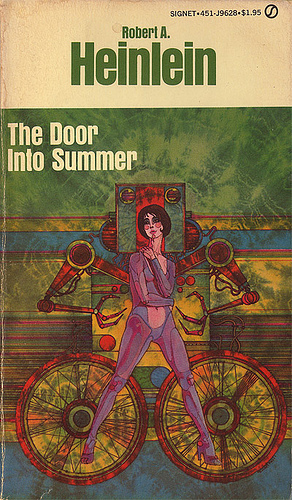Retrograde
Run Silent, Run Free
Douglas Trumbull's "Silent Running"
by Daniel C. Smith

Perhaps more than any
other, the late Robert A. Heinlein epitomizes the twentieth century
science fiction writer. His stature is that of icon, and he
is the winner of any award and honor worth having in the field.
Heinlein penned the sci-fi milestones Stranger in a Strange
Land
and The Cat Who Walked Through Walls
as well as the teenage classics Have Spacesuit, Will Travel
and Rocketship Galileo. Many of his
novels have been made into major motion pictures (Starship
Troopers, The Puppet Masters) and his influence and presence
still resonates with writers today. The only trouble with
being a new (or even old ) fan of so prolific a writer is that
sometimes a true gem can slip through the cracks of said writer's
repertoire, most often overshadowed by more publicized or successful
works (or, in Heinlein's case, controversial). These works
are often unknown even to the most diehard of fans; I believe that that
is the case with one of my favorite early-Heinlein novels,
The Door into Summer, originally published in 1956.
This is the story of
Daniel Boone Davis, an atypical Heinlein character in many ways:
crafty, independent and smart-- very 'Americana' if you will (with a
strong nod to Horatio Hornblower, heavily laden with the Libertarian
sensibilities that smack of more than just a foreshadowing of
Heinlein's beloved character Lazarus Long), scrappy and resolute-- yet
there is a certain vulnerability about the man which not only endears
him to the reader but also allows him to be duped in a business
transaction by his best (human) friend and the woman with whom he had
fallen madly in love. In a fit of depression, he decides to
take 'the big sleep', i.e., cryogenic suspension (although taken for
granted by a reader of sci-fi today, the idea of human hibernation was
relatively new when this novel was originally written).
This is one of the
more intriguing aspects of this novel, Heinlein's uncanny ability to
see around the corner of technological innovation. This book
is a true product of the 'Golden Age' of sci-fi, and Heinlein's
near-prescience as to the direction of technology and cultural trends
are what made him a master of that bygone era. This story's
protagonist, as an inventor, takes the reader inside the design of many
(at that time) futuristic, robotic machines, many of which (surely you
will recognize
Hired Girl) have found their way to today's
marketplace. While daydreaming, our hero outlines plans for a
machine in his head that will perform what we can now recognize as
computer aided drafting (CAD).
Heinlein also offers
a glimpse of the future of film with a brief mention of interactive
theater; remember Douglas Trumball, the director of Silent
Running? He is now a pioneer in this new field of
interactive or audience participation theater, a field that he has
virtually invented, the eventual progression of which is the
'holo-deck' (with all of its interactive capabilities) popularized by
the various Star Trek television series.
Add ATM's, ideas for
'solid' circuits (solid state circuitry was still many years away) and
postulations on the fallibility of government-subsidized industry and
it becomes easy to think of Heinlein not just as a great science
fiction writer but perhaps as a prophet as well.
But wait, there's
more. In order to find his own 'door into summer' our hero
must open a door back into the past and travel-- through 'temporal
displacement'-- back to where (and when) he started. An
arduous enough journey, but one that will prove worth it-- if he can
save his fortune, get revenge on his best friend and former
fiancée, get the girl, and most importantly , find his cat.
While
The Door Into Summer does not focus on many of Heinlein's
more mature themes and concepts that made many of his later classics
(such as
Stranger In A Strange Land or Friday) so
compelling (and controversial), it is an enjoyable read, a great
adventure that spans decades and it is chock full of everything that
made the Golden Age of science fiction the definitive era
of the genre and, more importantly, all of the things that make science
fiction… FUN.
If you're a Heinlein
fan and you overlooked this one, put it on your list-- and if you're
new to Heinlein and would like to familiarize yourself with his work,
this book is as good a starting place as any. Of
course, every sci-fi fan should be familiar with Stranger In
A Strange Land, but I also recommend, in addition to all of
the titles mentioned thus far, the novels The Moon Is A Harsh
Mistress,
Job: A Comedy of Justice, Methuselah's
Children, and of course Time Enough For Love.
Heinlein also wrote a plethora of short stories, including the classic
tales Universe, Jerry Was A Man, and
The Roads Must Roll. While there is
nothing in the Heinlein catalog not worth reading, these handful of
titles represent what I feel are the highlights of a truly stellar
career.
© 2011 Daniel C. Smith
Daniel C. Smith has published over a hundred stories, poems, articles and reviews in venues such as Bare Bone, Tales of the Talisman, The Leading Edge, Star*Line, and Space and Time.
Comment on this story in the Aphelion Forum
Return to Aphelion's Index page.
|




